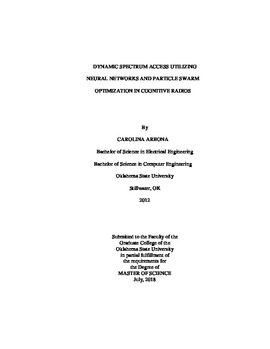| dc.contributor.advisor | Scheets, George | |
| dc.contributor.author | Arbona, Carolina | |
| dc.date.accessioned | 2019-07-19T14:08:44Z | |
| dc.date.available | 2019-07-19T14:08:44Z | |
| dc.date.issued | 2018-07-01 | |
| dc.identifier.uri | https://hdl.handle.net/11244/320958 | |
| dc.description.abstract | In recent years, spectrum policy has shifted and has become more accepting of dynamic spectrum access. Technology improvements such as software defined radio and cognitive radio has allowed research to explore more into this field. Software-defined radio has the ability to switch the transmission parameters, such as modulation schemes; Cognitive Radio extends software defined radio by giving it a brain to decide which of those parameters to choose. Spectrum management can be broken down into four steps: spectrum sensing, spectrum decision, spectrum sharing and spectrum mobility. This paper will assume that the spectrum sensing is already known and is only interested in the spectrum decision aspect. The author introduces a hybrid approach of an Artificial Neural Network (ANN) which is trained by another biologically inspired algorithm: Particle Swarm Optimization (PSO) for the spectrum decision aspect. ANNs were chosen due to their universal function approximation capabilities. PSO was chosen to train the ANN given its fast convergence and ability to search a complex and non-continuous state-space. The PSO-ANN hybrid technique will be compared to game theoretic 'Regret-Based Learning' procedures. This thesis seeks to gain a better comprehension of learning schemes used in the creation of the cognitive engine and shed knowledge on the decision capabilities through data derived from a decentralized system. This research was able to find acceptable PSO-ANN configurations that boasted improved utilities with respect to 'Regret Tracking'. These improved outcomes were reached faster, with convergence occurring quickly. This phenomenon occurred in both static and dynamic situations and for congested and non-congested environments. Regret tracking has faster computational speeds for small simplified networks but scales very poorly for more system channels or more channels allowed per secondary users, with both speed and system memory being of concern. Regret tracking was found to require evaluation and therefore sensing of every option whereas PSO-ANN only evaluates a handful of particle options. The decrease sensing needs of PSO-ANN make it much more practical for implementation. Due to all the limitations in regret tracking that PSO-ANN overcomes, it should be a preferred choice when working with dynamic spectrum access. | |
| dc.format | application/pdf | |
| dc.language | en_US | |
| dc.rights | Copyright is held by the author who has granted the Oklahoma State University Library the non-exclusive right to share this material in its institutional repository. Contact Digital Library Services at lib-dls@okstate.edu or 405-744-9161 for the permission policy on the use, reproduction or distribution of this material. | |
| dc.title | Dynamic Spectrum Access Utilizing Neural Networks and Particle Swarm Optimization in Cognitive Radios | |
| dc.contributor.committeeMember | Yen, Gary G. | |
| dc.contributor.committeeMember | Sheng, Weihua | |
| osu.filename | Arbona_okstate_0664M_15942.pdf | |
| osu.accesstype | Open Access | |
| dc.description.department | Electrical Engineering | |
| dc.type.genre | Thesis | |
| dc.type.material | Text | |
